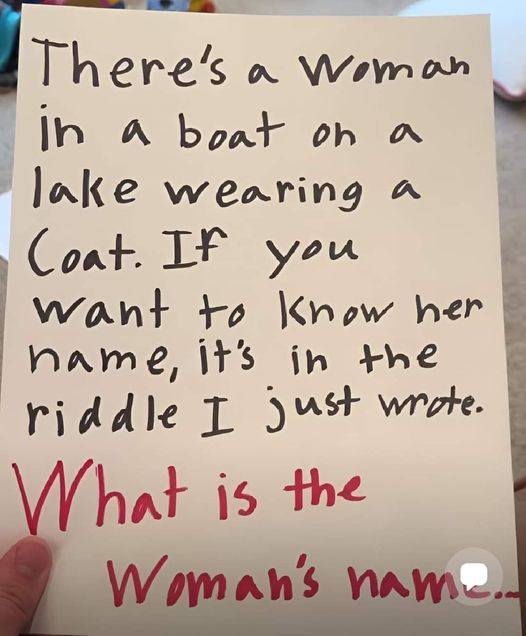Riddles have long been a source of entertainment and mental stimulation, challenging individuals to think creatively and pay close attention to detail. One such riddle that has recently gained widespread attention is the “Woman in a Boat” puzzle. This seemingly simple riddle has left many scratching their heads, making it a perfect example of how language and perception can play tricks on our minds.
The Riddle
The riddle goes as follows:
“There is a woman in a boat, on a lake, wearing a coat. If you want to know her name, it’s in the riddle I just wrote. What’s her name?”
At first glance, this riddle appears straightforward, but its simplicity is deceptive. The challenge lies in interpreting the wording carefully to uncover the woman’s name.
Hints to Consider
To solve this riddle, it’s essential to focus on the specific phrasing used. Here are some hints to guide you:
- Pay Attention to the Wording: The riddle states that the woman’s name is “in the riddle I just wrote.” This suggests that the name is embedded within the text itself.
- Look for Unconventional Names: The name may not be a traditional one. Consider how words or phrases within the riddle could be interpreted as a name.
- Break Down the Sentence: Analyze each part of the riddle to see if any segment stands out as a potential name.
The Solution
Upon careful examination, the answer to the riddle is:
“There.”
Here’s the breakdown:
- The riddle begins with “There is a woman in a boat…” This can be rephrased as “There’s a woman in a boat…”
- The phrase “There is” or “There’s” can be interpreted as the woman’s name being “There.”
- Therefore, the woman’s name is “There.”
This clever play on words is what makes the riddle both challenging and amusing. It requires the solver to think beyond conventional names and consider how language can be manipulated to create a puzzle.
Why This Riddle Is Effective
The “Woman in a Boat” riddle exemplifies how language can be used to create engaging and thought-provoking puzzles. It plays on the reader’s expectations and encourages a different perspective. Such riddles are not only entertaining but also serve as excellent exercises for the brain, promoting lateral thinking and attention to detail.
The Importance of Riddles in Cognitive Development
Engaging with riddles like this one offers several cognitive benefits:
- Enhances Problem-Solving Skills: Riddles require individuals to think critically and explore various solutions.
- Improves Comprehension: Understanding the nuances of language used in riddles can enhance reading comprehension and interpretation skills.
- Encourages Creative Thinking: Solving riddles often involves thinking outside the box and approaching problems from unique angles.
Conclusion
The “Woman in a Boat” riddle is a delightful example of how language and perception can intertwine to create a challenging puzzle. By carefully analyzing the wording and considering unconventional interpretations, solvers can uncover the hidden answer. Engaging with such riddles not only provides entertainment but also contributes to cognitive development, making them a valuable activity for individuals of all ages.

